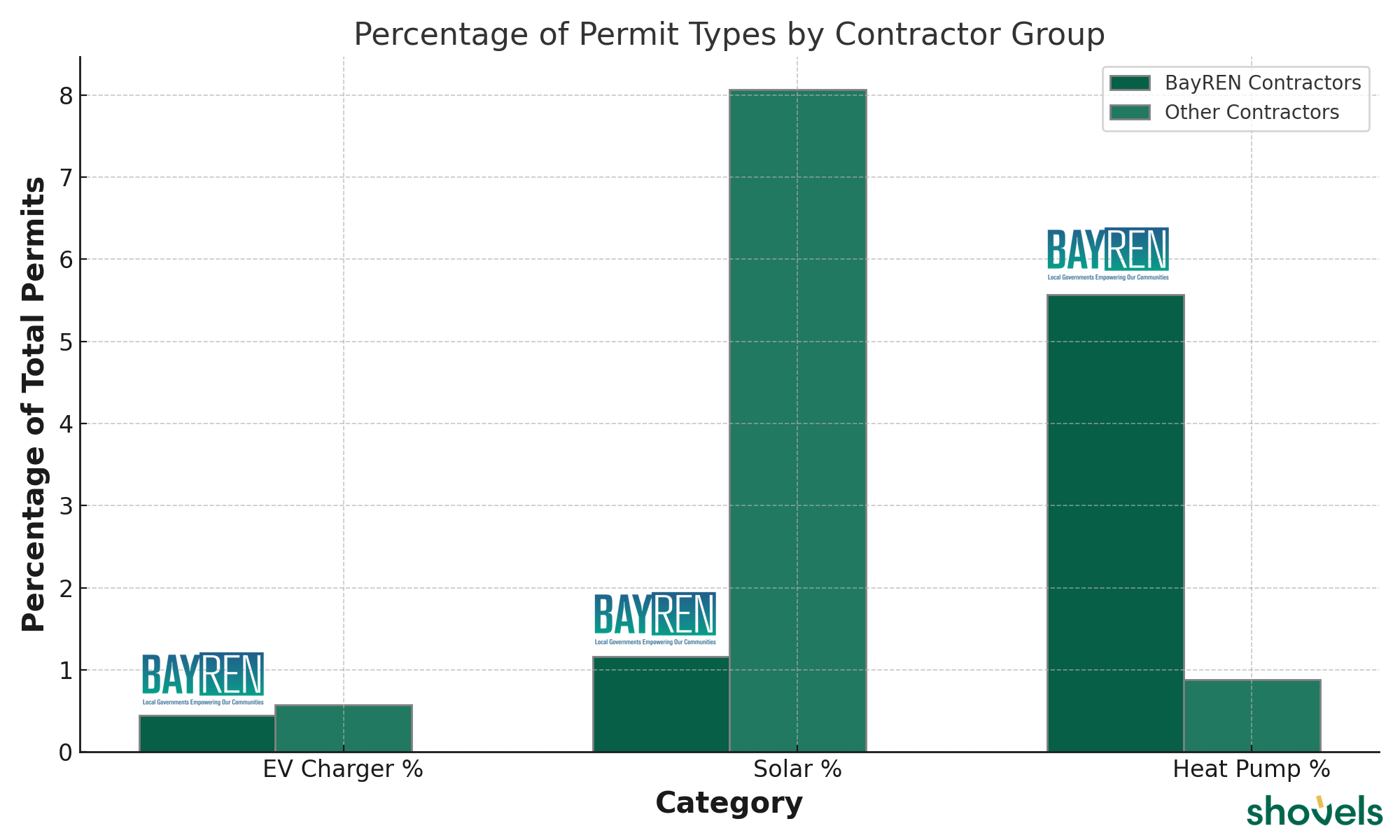A key player in the building electrification transformation in the San Francisco Bay Area is the Bay Area Regional Energy Network (BayREN). Over the past decade it has become synonymous with fostering environmentally conscious decisions among communities and building contractors alike.
Our recent research into building permits has revealed compelling trends that not only underscore BayREN's influence but also signal a shift in the region's approach to energy efficiency. By analyzing building permits, we discovered a stark difference in the uptake of various energy upgrades between contractors affiliated with BayREN and those who are not. This isn't just numerical variance; it's a narrative about where we're heading and what fuels our journey towards a greener Bay Area.

The data paints a telling picture: BayREN contractors are installing significantly more heat pumps than their non-affiliated counterparts. Why heat pumps? Heat pumps are a linchpin in the arsenal against energy inefficiency. They serve dual purposes, providing heating and cooling in a single system, and they're remarkably efficient, actually cutting down total energy use compared to traditional HVAC systems.
This finding aligns perfectly with BayREN's strategic priorities. By streamlining the installation of heat pumps, BayREN is not just pushing for a reduction in greenhouse gas emissions; it's also promoting a technology that can adapt to and leverage the Bay Area's mild climate, proving to be both a cost-effective and environmentally friendly solution for local homeowners and businesses.
Interestingly, the same research indicated that BayREN contractors install fewer solar panels than their peers. This could seem counterintuitive at first glance, given the solar industry's growth and the region's ample sunshine. However, this trend could be attributed to several factors. Perhaps the solar market in the Bay Area is already well-developed, necessitating less intervention. Alternatively, it could be that BayREN's current initiatives are designed to fill gaps in the building electrification market where other technologies, such as heat pumps, have yet to mature. It's also possible that the existing financial incentives for solar installations are already optimized, so BayREN focuses its resources on other technologies in need of a push.
When it comes to electric vehicle (EV) charger installations, the numbers align closely between BayREN contractors and others. EV technology is an area of robust growth, supported by statewide initiatives and private investments alike. The parallel trends here suggest that the push for EV infrastructure might be equally strong across the board, indicating that BayREN's efforts in this domain are complementing an already thriving market.
So, what do these trends mean for the Bay Area's energy landscape? They showcase BayREN's role in helping the region's energy efficiency trajectory. By fostering the adoption of heat pumps, BayREN is helping to redefine the standard for residential and commercial heating and cooling systems. This not only contributes to lowering carbon footprints but also aligns with broader goals of resilience and sustainability.
The data also prompts a re-evaluation of solar energy's place in the Bay Area's proptech scene. With the solar panel market potentially approaching saturation, it may be time to innovate further or redirect focus to complementing technologies that enhance solar efficiency or storage.
Our findings illuminate the nuanced dynamics of energy upgrades in the Bay Area. As BayREN continues to lead with forward-thinking programs, it remains crucial for us to monitor how these initiatives shape both the demand and the labor market to install these systems. The shifts we see today, influenced by BayREN's strategic decisions, are creating a blueprint for other regions to follow. And as we continue to gather data and analyze trends, we look forward to contributing the conversation around proptech and sustainability.


